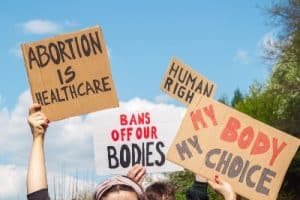
A new analysis by the U.S. Congress Joint Economic Committee (JEC) reveals that states with the most restrictive abortion laws have the worst economies for families.
These states also have lower earnings for women and higher child poverty rates, according to a press release.
“Stripping away access to reproductive healthcare and the right to make decisions about one’s own body undermines individual freedom, and as prior JEC analysis has shown, it also threatens U.S. economic growth and stability,” JEC Chairman Don Beyer of Virginia said in the press release. “From lower earnings among women to higher child poverty rates, from less investment in early childhood education to barriers to accessing healthcare, evidence shows the states that restrict access to abortion are also failing to ensure children, women and families can thrive. Promoting community health and well-being are essential to a strong country and a strong economy. By falling short, the very foundations of our economy are undermined.”
In June 2022, the Supreme Court overturned Roe v. Wade, which had set the precedent of the guaranteed right to a safe and legal abortion in the United States for 50 years. States have since enacted laws restricting access to abortions. According to the press release, in states where abortion is severely restricted, women will be constrained from making decisions. The ability to decide when to have a child is an issue of individual agency, and one that has far-reaching economic consequences for women, their families and communities.
The JEC’s data show that states with strict abortion access also do not have policies to support economic resiliency, positive health and educational outcomes for families. In states with restrictive abortion laws, the analysis revealed women have lower median earnings, child poverty rates are higher, health insurance for the neediest families is more difficult to access, paid family leave does not exist and spending on K-12 education is lower.
The analysis, according to the press release, shows that abortion access is key to economic freedom. Beyer voted for the Women’s Health Protection Act to codify Roe v. Wade protections in September 2021 when the House passed the bill.
The JEC, created in 1946 with passage of the Employment Act, is tasked with reviewing economic conditions in America and recommending economic policy.










